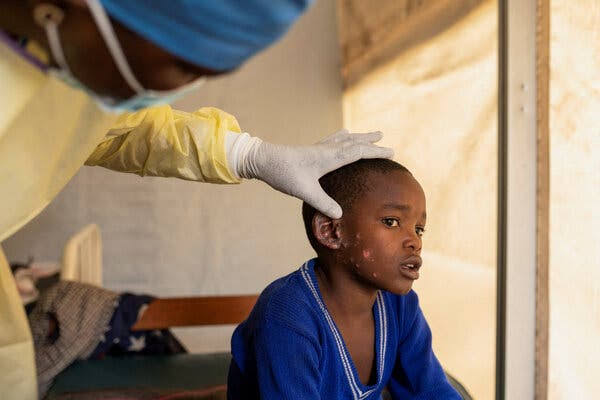Amidst a growing health crisis in eastern Congo, Justine Munguiko, a mother at a displacement camp near Goma, is dealing with the effects of a mysterious illness that has struck her baby, Fidele, and other children in the camp. The Democratic Republic of Congo is currently facing an Mpox outbreak, which has recently been declared a global public health emergency.
Munguiko and other mothers have resorted to traditional methods to manage their children’s symptoms, such as bathing them in boiled salty water and using leaves from the Kitamatama plant. Despite local beliefs that the illness may be related to bushmeat consumption, Munguiko reports that neither she nor her child have consumed bushmeat. As she tends to her baby, who still has crusty sores on his wrists and feet, the urgent need for additional support for these vulnerable communities becomes increasingly clear.
As efforts continue globally to secure adequate vaccines, Munguiko’s situation reveals the critical need to ensure that the most vulnerable populations receive the proper knowledge and resources to protect themselves from a viral infection that, although often mild, can be severe. Ebere Okereke, an associate fellow at Chatham House’s Global Health Programme, stressed the importance of effective communication. “It’s vital to provide accurate information to those who are most at risk,” she stated.
The Mpox outbreak in Congo, which started in January 2023, has resulted in approximately 27,000 cases and over 1,100 deaths, primarily among children. The virus has also spread to neighboring countries.
On Monday at the Kanyarutshinya camp, residents gathered in an open space between the tents to hear a health worker from the aid organization Medair provide information on preventing the infection. They were given a colorful leaflet with illustrations showing the risks of close contact with infected animals or people.
Helen Rees, co-chair of South Africa’s Mpox incident management team, noted that the situation in Congo and other African countries is exacerbated by insufficient funding for research. “Our global understanding of Mpox, including its spread and the number of asymptomatic cases, is still limited,” she stated.
After the Medair presentation, one individual examined the leaflet carefully and expressed relief, saying, “We were unaware that there was a treatment for this disease. I’m glad to learn that it can be cured.”

